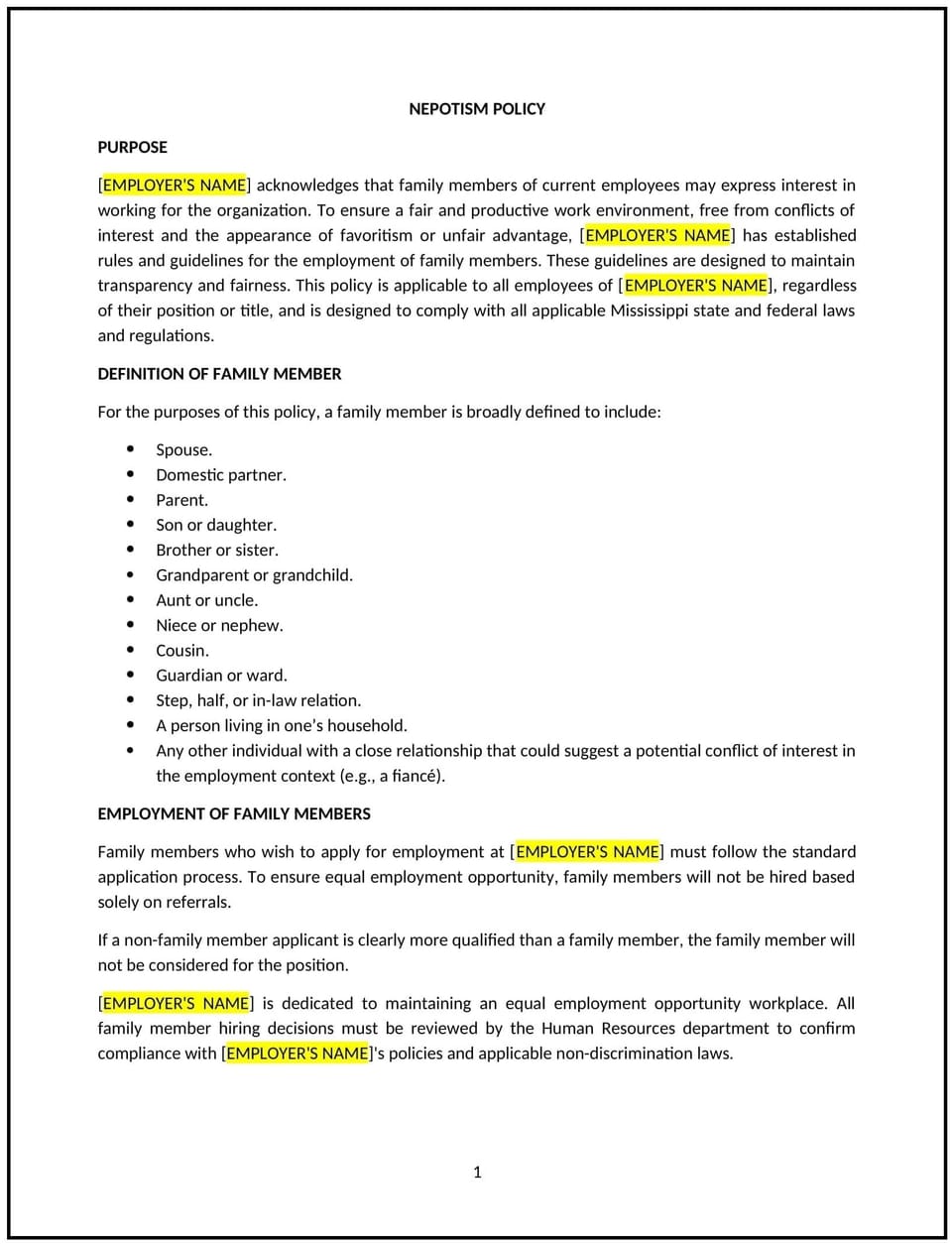Nepotism policy (Mississippi): Free template

Nepotism policy (Mississippi)
A nepotism policy outlines the guidelines for businesses regarding the employment of relatives or family members. It ensures that hiring, promotion, and employment decisions are based on merit rather than personal relationships. This policy helps maintain fairness in the workplace, mitigates potential conflicts of interest, and promotes a transparent work environment.
By implementing this policy, businesses in Mississippi can establish clear boundaries for hiring and employment practices related to family members, ensuring that these decisions are objective and in the best interest of the company.
How to use this nepotism policy (Mississippi)
- Define family relationships: Clearly outline what constitutes a family member under this policy, including spouses, children, siblings, and extended relatives.
- Set restrictions on hiring family members: Specify whether employees are allowed to hire family members, and if so, under what conditions. The policy may limit family members from working in the same department or having reporting relationships.
- Prohibit conflicts of interest: Ensure that no family member is in a position to influence the hiring or promotion of another family member. Clarify that employees should avoid participating in decisions involving family members' employment.
- Outline approval processes: Establish an approval process for hiring or promoting family members. For example, require that the decision is reviewed and approved by HR or a senior leader to ensure transparency.
- Maintain fairness in promotions and raises: The policy should emphasize that promotions, salary increases, and other employment decisions will be made based on merit, qualifications, and performance rather than family connections.
- Ensure transparency: Encourage employees to disclose any familial relationships within the workplace to HR to ensure transparency and reduce the risk of favoritism or bias.
- Review and update the policy regularly: Periodically review and update the nepotism policy to ensure it aligns with the business’s evolving needs, applicable laws, and best practices.
Benefits of using this nepotism policy (Mississippi)
This policy offers several benefits for Mississippi businesses:
- Promotes fairness and merit-based decisions: The policy helps ensure that hiring, promotions, and other employment decisions are made based on qualifications and performance, not personal relationships.
- Reduces conflicts of interest: By limiting family relationships in certain roles, businesses can reduce potential conflicts of interest and the perception of favoritism.
- Protects company culture: Ensuring that employment decisions are based on merit helps foster a culture of fairness, transparency, and professionalism.
- Enhances employee morale: When employees perceive that decisions are made based on fairness and not family connections, they are more likely to feel motivated and engaged in their work.
- Reduces legal risks: Implementing a clear nepotism policy reduces the risk of discrimination or bias claims related to family employment decisions.
Tips for using this nepotism policy (Mississippi)
- Clearly communicate the policy: Make sure all employees are aware of the nepotism policy by including it in the employee handbook or during onboarding, and regularly reminding employees of its importance.
- Ensure proper disclosure: Encourage employees to disclose any family relationships within the workplace, particularly when applying for positions or considering promotions.
- Maintain transparency in decision-making: Ensure that decisions related to family members are made transparently and with input from senior leadership or HR to avoid the appearance of favoritism.
- Review potential conflicts of interest: Regularly assess whether any familial relationships are causing conflicts of interest or creating an unfair work environment.
- Monitor the effectiveness of the policy: Evaluate the effectiveness of the nepotism policy periodically and make adjustments if needed to ensure it continues to serve the business's needs and values.
Q: Why should Mississippi businesses have a nepotism policy?
A: A nepotism policy helps businesses promote fairness and transparency in hiring, promotions, and employment decisions. It ensures that decisions are based on merit, reduces conflicts of interest, and prevents the perception of favoritism.
Q: What family relationships are covered under the nepotism policy?
A: The policy should clearly define the types of family relationships that are covered, including spouses, children, siblings, and other extended family members, and specify how these relationships will affect employment decisions.
Q: Can family members work together in the same department?
A: The policy may restrict family members from working in the same department or from having a direct reporting relationship. However, this will depend on the company’s specific needs and the potential for conflicts of interest.
Q: What happens if an employee is found to be in a conflict of interest due to a family relationship?
A: If a conflict of interest arises, the company should take appropriate actions, such as reassigning roles or responsibilities, or adjusting reporting lines to eliminate the conflict.
Q: Can an employee’s family relationship affect their promotion or pay increase?
A: No, promotions, raises, and other decisions should be based solely on merit, qualifications, and performance, rather than family connections.
Q: How should businesses handle family relationships during the hiring process?
A: Businesses should require employees to disclose any family relationships at the time of hiring and ensure that these relationships do not influence the hiring process. Decisions should be reviewed by HR or senior management for impartiality.
Q: How often should the nepotism policy be reviewed?
A: The policy should be reviewed regularly, at least annually, to ensure it is effective and aligns with any changes in business needs, laws, or best practices.
This article contains general legal information and does not contain legal advice. Cobrief is not a law firm or a substitute for an attorney or law firm. The law is complex and changes often. For legal advice, please ask a lawyer.


